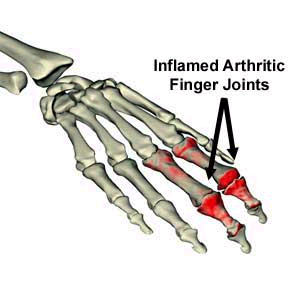
| ||||||
|

Diet And Rheumatoid Arthritis
Living With Rheumatoid Arthritis
![]()
• Use the basic USDA food pyramid to plan meals.
• Eat 1 to 1.2 grams of protein per kilogram of body weight (to make up for the protein lost in the inflammatory process).
• Take extra folic acid to help ease or prevent some of the side effects of methotrexate. (Methotrexate is an anti-metabolite which blocks reactions necessary to produce precursors to DNA synthesis. Folic acid is displaced from the enzyme dihydrofolate reductase by the drug and the unbound folic acid is excreted. It is often used in low doses in the treatment of RA to suppress the immune system).
Since there is no known cure for RA, current modes of treatment focus primarily on alleviation of symptoms using drug therapy. Some medications are used only for pain relief; others are used to reduce inflammation. Still others—often called disease-modifying antirheumatic drugs, or DMARDs—are used to try to slow the course of the disease. Corticosteroids, also known as glucocorticoids, such as Prednisone (Deltasone, Orasone) and Methylprednisolone (Medrol) are used in the treatment of RA for their anti-inflammatory and immunosuppressive effects. These powerful drugs put the patient at increased risk for osteoporosis. People on long-term steroid therapy may benefit from nutritional counseling discussing the role of calcium, vitamin D, and weight bearing exercise on the prevention and treatment of osteoporosis.
This material is not intended as a guide to self-medication. The reader is advised to discuss the information provided here with a doctor, pharmacist, nurse, or other authorized healthcare practitioner and to check product information (including package inserts) regarding dosage, precautions, warnings, interactions, and contraindications before administering any drug, herb, or supplement discussed herein.